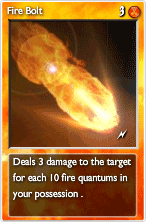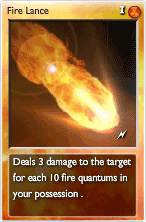Fire Bolt
|
|
Contents
Overview
Fire Bolt has only one purpose: to do massive harm, either to a creature or the opponent. The more ![]() quanta one has, the more damage the spell can deal. As such, Fire Bolts are often used to deliver the final blow against opponents who aren't fast enough for the K.O.
quanta one has, the more damage the spell can deal. As such, Fire Bolts are often used to deliver the final blow against opponents who aren't fast enough for the K.O.
General Use
Quick Facts:
- Fire Bolt will deal a minimum of 3 damage.
- Fire Bolt can target both players (directly) and creatures.
- Fire Bolt can deal a maximum of 24 damage.
Fire Bolt will deal a minimum of 3 damage no matter what. However, an extra 3 points of damage can be dealt for each 10 ![]() quanta the player possesses. This is calculated before subtracting the spell cost. For example:
quanta the player possesses. This is calculated before subtracting the spell cost. For example:
- 3-9 quanta -> 3 damage
- 10-19 -> 6 damage
- 20-29 -> 9 damage, and so on.
Using several Fire Bolts in one turn can result in an instant victory. Some decks ("sudden killers") rely on stalling, waiting for a mass production of ![]() quanta, and killing the opponent in a single turn. It's important to note that this type of damage requires some thoughtful calculation in order to ensure the final blow can be dealt within a given try, else the opponent can use the opportunity to heal themselves or finish the attacker off the next turn. (For more help with calculations, jump to the end of this article.)
quanta, and killing the opponent in a single turn. It's important to note that this type of damage requires some thoughtful calculation in order to ensure the final blow can be dealt within a given try, else the opponent can use the opportunity to heal themselves or finish the attacker off the next turn. (For more help with calculations, jump to the end of this article.)
One small tip is that the "fire bolt effect" can be randomly summoned by Chaos Seed or Pandemonium. If either form of CC produces a Fire Bolt, the amount of damage dealt to the creature is based off the amount of ![]() quanta the user possesses at the time. Below is a table of how Fire Bolts scale. The numbers given are the amount of
quanta the user possesses at the time. Below is a table of how Fire Bolts scale. The numbers given are the amount of ![]() quanta needed to deal a certain amount of damage depending on the amount of bolts/lances a player can shoot off at once. NOTE: Due to the fact that quanta is capped at 75 for each elemental pool, some of the tables below prove that users cannot 'instant-kill' someone using a single Bolt.
quanta needed to deal a certain amount of damage depending on the amount of bolts/lances a player can shoot off at once. NOTE: Due to the fact that quanta is capped at 75 for each elemental pool, some of the tables below prove that users cannot 'instant-kill' someone using a single Bolt.
Synergies
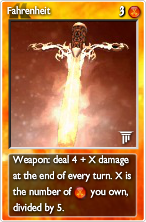 One of the main cards Fire Bolt is paired with is Fahrenheit | Fahrenheit. Since the damage from Fahrenheit scales with
One of the main cards Fire Bolt is paired with is Fahrenheit | Fahrenheit. Since the damage from Fahrenheit scales with ![]() quanta as well, both cards can work together to deliver loads of damage. In fire stalls, bolts can be used as creature control while the Fahrenheit can serve as the main form of damage, whittling the opponent's health away gradually. It's important to note that these types of strategies require constant and careful calculation for delivering the final blow should the player use all of their Fire Bolts, or else the enemy may make a full recovery and undo the damage dealt.
quanta as well, both cards can work together to deliver loads of damage. In fire stalls, bolts can be used as creature control while the Fahrenheit can serve as the main form of damage, whittling the opponent's health away gradually. It's important to note that these types of strategies require constant and careful calculation for delivering the final blow should the player use all of their Fire Bolts, or else the enemy may make a full recovery and undo the damage dealt.
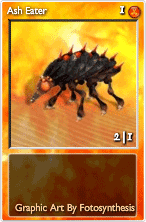 Ash Eater | Brimstone Eater also has a simple, yet effective combo with Fire Bolt. While the unupped form of the creature can serve as Cremation fodder to quickly generate
Ash Eater | Brimstone Eater also has a simple, yet effective combo with Fire Bolt. While the unupped form of the creature can serve as Cremation fodder to quickly generate ![]() , Brimstone Eater’s ability will trigger and generate 1
, Brimstone Eater’s ability will trigger and generate 1 ![]() each turn (as long as it isn’t frozen or delayed) after attacking. Although these creatures are extremely delicate (1 HP), they often can shave off modest amounts of HP (2 ATK each turn) from the opponent, thus decreasing the amount of
each turn (as long as it isn’t frozen or delayed) after attacking. Although these creatures are extremely delicate (1 HP), they often can shave off modest amounts of HP (2 ATK each turn) from the opponent, thus decreasing the amount of ![]() quanta needed for the final bolt blow.
quanta needed for the final bolt blow.
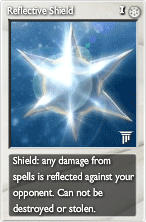 As with all direct-damage spells, Fire Bolt will be reflected by certain shields when targeting the opponent's lifebar. Things can get tricky if the opponent equips one of these shields, as the immaterial shield will prevent a player from directly hitting the opponent's HP (unless the player wants the spell to boomerang back). Since the shields cannot be targeted by permanent control (e.g., Steal, Deflagration), using a reflective shield of some sort can work around the opposition's defense; if a player equips a Reflective shield | Mirror Shield and targeting themselves, the damage will bounce off them and hit the opponent instead. In this situation, Reflective Shield is often the preferred choice, as it only needs 1
As with all direct-damage spells, Fire Bolt will be reflected by certain shields when targeting the opponent's lifebar. Things can get tricky if the opponent equips one of these shields, as the immaterial shield will prevent a player from directly hitting the opponent's HP (unless the player wants the spell to boomerang back). Since the shields cannot be targeted by permanent control (e.g., Steal, Deflagration), using a reflective shield of some sort can work around the opposition's defense; if a player equips a Reflective shield | Mirror Shield and targeting themselves, the damage will bounce off them and hit the opponent instead. In this situation, Reflective Shield is often the preferred choice, as it only needs 1 ![]() quantum to summon, compared to Emerald Shield which requires 5
quantum to summon, compared to Emerald Shield which requires 5 ![]() quanta to play.
quanta to play.
Other Cards With Synergy
The majority of decks that use Fire Bolt or Fire Lance often use various other low-cost Fire cards to deal with major offensive and defensive threats; Deflagration can be used to remove risky weapons (like Discord, which affects one's quanta), while Rage Elixir can remove a single creature (since a majority of creatures have less than 5-6 HP). Fire Shield can also assist in indirect creature control, as attacking creatures will be damaged by the shield and more susceptible to other CC cards (or killed by the shield itself).
Players also tend to pair up healing cards when using Fire Lance as a final attack; Sanctuary as well as the elusive Shards of Gratitude and Divinity (depending on one's mark) can provide general healing over time or health boosts when needed, further increasing the difficulty of defeating a Fire Bolt spammer.
Conclusion
A quintessential example of the aggressive nature of the Fire element, Fire Bolt is a threat to any unprepared deck. Players that see their opponent building loads of ![]() quanta should act fast and finish them off as soon as possible, or else they might find themselves finished in a single turn.
quanta should act fast and finish them off as soon as possible, or else they might find themselves finished in a single turn.
Popular Deck
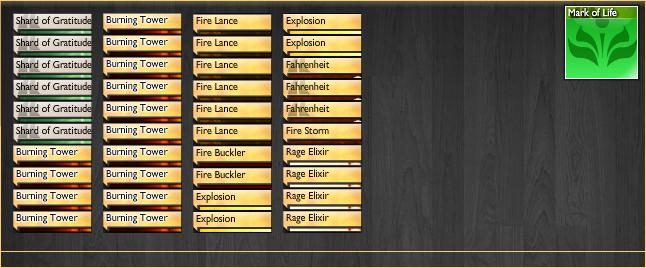
6rn 6rn 6rn 6rn 6rn 6rn 7dg 7dg 7dg 7dg 7dg 7dg 7dg 7dg 7dg 7dg 7dg 7dg 7dg 7dg 7dk 7dk 7dk 7dk 7dk 7dk 7dl 7dl 7dm 7dm 7dm 7dm 7dn 7dn 7dn 7do 7dr 7dr 7dr 7dr
